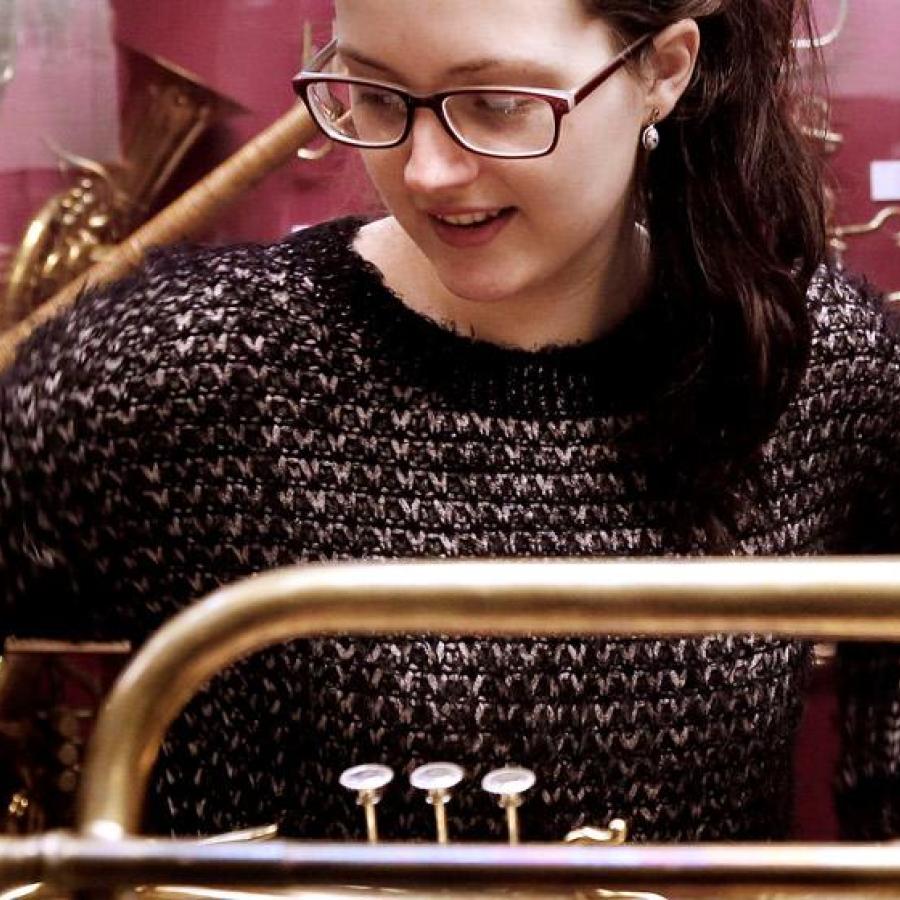Dr Morag Josephine Grant

Biography
M.A. (Hons), University of Glasgow; M.Mus, Ph.D, King’s College London
Morag began her musicological career at the University of Glasgow, where she studied music as part of a general arts degree. Her interest in twentieth century art music took her to London and thereafter Berlin, where she lived for almost twenty years before joining the University of Edinburgh in 2017.
Morag's work combines sociological, anthropological and historical perspectives to investigate what musical communication in the broadest sense can tells us about human social life. Her writing on post-war serial and experimental music, for example, explores how this music challenges Enlightenment and post-Enlightenment ideas about what music is. She has also worked extensively on the historical anthropology of music in Britain, with a particular focus on Scotland, and on songs and singing.
Currently, most of Morag’s work investigates music and violence – specifically, how music is used to promote, facilitate and accompany collective and political violence. From 2008-2014, as a junior professor of musicology at the University of Göttingen, she led the research group "Music, Conflict and the State": alongside projects on music and genocide, in armed conflict and in the context of colonialism, the group helped pioneer research into the use of music to torture. Morag's work in these areas has also been supported by a fellowship at the Käte Hamburger Centre of Advanced Study “Law as Culture” at the University of Bonn, a research visitorship at the at the University of Vienna from the Balzan research project “Towards a Global History of Music”, and a major grant from the Harry Frank Guggenheim Foundation.
Previously, Morag has taught musicology at the European College of Liberal Arts (now Bard College Berlin), and the Humboldt-Universität zu Berlin in addition to the University of Göttingen She has also delivered training on human rights and human rights activism, and taught political and religious rights at the Leuphana-Universität Lüneburg. She is a member of the Editorial and Advisory Board of the Musica Scotica Trust and the Editorial Board of Contemporary Music Review.
Research interests
- Music Sociology
- Musicology of war and collective violence
- New and experimental composition since 1950
- Song studies
- Music and human rights
I teach two honours courses in rotation: Music, Racism and Western Ideology, and The Musicology of War. I am also course organiser for the first-year BMus course Thinking About Music. I regularly contribute to other courses in musicology at undergraduate and postgraduate levels.
Research
Research
As a music sociologist in the German tradition of Christian Kaden and others, I regard music and musicality as a central aspect of what it means to be human, and as a significant driver in many aspects of human sociality and human society. My work draws on historical, anthropological and sociological approaches and methods, and is fundamentally interdisciplinary in nature.
For over a decade now, my work has focused on the musicology of war and collective violence, especially where music is used to promote, prepare and facilitate violence. My research in this area has included work on genocide and on the use of music as an instrument of torture. I have an extensive list of publications on this topic, and actively seek to support and promote the work of others scholars working on these issues, including through organising conferences and workshops, and co-editing a number of publications on these topics. I am currently writing a monograph on the musicology of war, which develops a theoretical framework for studying and understanding the historical and global role of music in warfare.
Together with Prof Kasey McCall-Smith (School of Law) I established the knowledge exchange project Environmental Conditions of Detention, which seeks to raise awareness globally on the impacts of the sensory environment of those deprived of their liberty. This project will aim to build on past research by myself and others into the use of music and sound as an instrument of ill-treatment and torture, and to apply this knowledge to prevent related abuses of the rights of detainees in future.
My other research interests include the social functions of songs and singing. My monograph Auld Lang Syne: A Song and Its Culture (Open Book Publishers, 2021) explores the cultural history of this iconic Scots song and how the social practices and rituals that have emerged around it have helped it become so meaningful for so many communities around the world. I’m a member of the Song Studies Network, sit on the editorial board of the Song Studies book series, and much of my work in the musicology of war has also related to the roles of songs and singing. As a member of the Editorial and Advisory Board of the Musica Scotica Trust, I’m also actively involved in promoting and conducting research into music in Scotland.
My original research interest, from my student days onwards, was the theory and aesthetics of new and experimental composition in the western art music tradition since ca. 1950. Since the publication of my monograph Serial Music, Serial Aesthetics: Compositional Theory in Post-war Europe (Cambridge University Press, 2001) I’ve continued to publish, teach, and lecture in this area, especially on the music and thinking of Karlheinz Stockhausen, and on the Wandelweiser group of composers.
In terms of historical and regional focuses, my specialisms lie in British (especially Scottish) and western/central European cultures (especially German-speaking) from ca. the eighteenth century onwards, but I also actively draw on research pertaining to other regions of the world and earlier historical eras. I am committed to the process of decolonisation of knowledge and research, and reflect on this in my work.
PhD Supervision Topics
- Music in the armed forces and in warfare, especially historically
- The use of music in connection with torture/ill-treatment of detainees
- Music and group-focused enmity, including in the context of genocide
- Music and human rights/humanitarian law
- I can consider proposals with any historical or global focus, pending identification of suitable additional supervisors where necessary.




